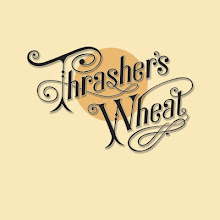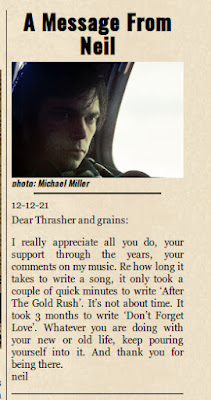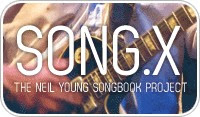Comment of the Moment: Fans Pre-Judgement of Americana Continues

(Zoom Album Cover)
Only within the past few days when UNCUT Magazine published "First Listen" , has anyone actually listened to "Americana" and been able to comment based on more than hearsay, rumor, innuendo, and/or album cover, liner notes and lyrics.
Yet -- a surprising (or maybe not) volume of fan commentary on the upcoming album Americana by Neil Young & Crazy Horse -- even though no one had even heard a single note.
So, naturally, our Comment of the Moment concerns preconceptions on Americana by Neil Young & Crazy Horse by Matt L.:
Is it really Neil's, or any artist's "responsibility" to either the song, history or the music fan, to adhere to or at least reference or explain the original purpose of a piece of music, and the political, social or spiritual climate of its time, in some way, so that the authenticity and history of something isn't lost or disrespected?
Does he owe it to the song, the song's author or the music fan to prostrate himself before the energy that created that piece of music and deliver it into the 21st century in a way that retains, and even helps to convey or preserve a clear idea of the song and its history? Or, more importantly, to not undermine reality or contribute to confusing, or even rewriting, history?
This is definitely a very important topic, and I feel strongly about retaining the purity of historical accounting, but I would argue "no" to the question of Neil's responsibility as an artist toward either some kind of historical or social accuracy, or toward supporting a certain political identification, or simply toward NOT doing something that could be perceived as insulting to those of us with touchy emotional triggers about American Indians, the dark history of Colonial America, or the authenticity of music history.
Why?
Because that is the job of historians. It is the job of artists to paint the sky with beauty, not to write history books.
They are free to be as accurate as they wish, should they desire to do so, or feel a sense of personal responsibility, but they should not be required to do so.
Neil has already explored American History many times in his songs, and has as much (ore moreso) converted it into dreams that reflect his own inner reality as address the significance of the topic's outer significance.
Take Pocahontas, my favorite Neil Young song. A deeply touching, overflowing statement about reducing the living, flowing passions of a thriving culture into a dusty historical relic admired by the very people who destroyed that culture.
It's so beautiful, haunting, thoughtful, everything that makes a passionate song something to revere. But is it a historical document, or a voyage through the soul of Neil Young himself, and his own internal contradictions, feelings of loss and yearning, a sort of poetic emoting from the past that he's channeling through the paint brush of his own inner being, that emerges in a wholly unique form from being filtered through him?
Or Peaceful Valley Boulevard. A very similar lament to Pocahontas, but much broader in context, that explores the relationships between scenes of early American settlers, this time being attacked and massacred by Indians, and how the brutality of ignorance, selfishness and fear have translated from one time period to another. From the peaceful valley to Peaceful Valley Boulevard, again crass American materialism sucking the life out of something beautiful and natural and turning it into something lifeless, meaningless and culturally or spiritually dead.
But are either of these songs really "accurate" in some important historical sense? Certainly they make references to terrible things that happened, in a general way, in the history of early America, and convey very poignantly the sense of hopelessness as industry and materialism annihilate the beauty of the world, which is all very important and meaningful...
...but are not both of these songs simply avenues for Neil to explore the confused and intense feelings inside himself, and in essence capture and discuss the commonality of these feelings in a more universal way that speaks to the human condition itself?
In the end, does it have to be pedantically accurate, or contain a specific accounting of history that is responsible in the way a history book should be (should be) responsible, or should it be a free-flowing statement of art that cries out from the soul of humanity, and is evocative, and causes people to feel and explore their own intense emotions and internalized confusion about life??
No, and yes. Neil has played around with history before, and used it in a way that furthers the latter process.
So why does altering a photograph constitute some kind of slap-in-the-face to history when it is not a historical accounting, but an artistic statement?
Why is accurately and clearly explaining a song's origination necessary?
None of the inaccuracies or alterations that Neil either willfully chooses to do, or simply accidentally does out of his own ignorance, are important to the artistic explorations themselves.
Altering things is as much a part of art as anything else, and in fact, throughout history, art has served as a vehicle for re-imagining things. And while the artist has every right to be as accurate as he or she wants, the very nature of artistic license makes it unnecessary to do so.
It's just not the purpose or responsibility of art, and in fact, if we perceived art to have that kind of responsibility, it would serve only to undermine the very free-flowing expressions and nature of art itself.
That said, is it really necessary for an artist like Neil to cater to everyone’s sensitivities? Altering a historical photograph is an artistic statement, not a historical statement. Is it necessary for an artist to say, “This is Americana and that is not Americana” in some sort of agreed-upon way because of some kind of universal social agreement that we have? Neil is not a historian. If he says God Save the Queen and Gallows Pole are going to appear on his “Americana” album, then well, dammit, that’s what he’s gonna do. It doesn’t invalidate the record, the music, or anything he’s doing. At all.
And as far as bigotry goes, I think we can all pretty much see the reality that Oh Susanna is always going to exist. It is a part of the lexicon of music from which America was born. I’m not sure whether Neil has altered the lyrics or something, or simply left in the racist overtones, or what. But it’s his right. Neil does not have to answer to anyone else’s sensitivities, and that’s not only his right as an artist, but it’s absolutely necessary. If Neil gave in to everyone’s sensitivities throughout his career, would half of his music even exist, and would the other half be nearly as good?
Getting offended at Neil Young is a laughable, ridiculous thing to do.
Any Neil Young fan should know by now that Neil’s art, as well as his ACTIONS, ARE sometimes offensive to peoples’ sensibilities, but that they are obviously necessary in order for his art to retain its biting, courageous spirit and authenticity.
Thank you Matt! Well put. Appreciate yours -- and everyone's else's -- opinion of Americana.
As for us? We can't wait to actually hear for ourselves, naturally. We'll try and not let our "pre-judgement biases" of Americana get the best of us. So we're confident that we can maintain that profile for the next 2 months... or not. ;)
















































 Human Highway
Human Highway

















 Concert Review of the Moment
Concert Review of the Moment





 This Land is My Land
This Land is My Land

 FREEDOM In A New Year
FREEDOM In A New Year









 *Thanks Neil!*
*Thanks Neil!*




![[EFC Blue Ribbon - Free Speech Online]](http://www.thrasherswheat.org/gifs/free-speech.gif)











 The Unbearable Lightness of Being Neil Young
The Unbearable Lightness of Being Neil Young Pardon My Heart
Pardon My Heart



 "We're The Ones
"We're The Ones  Thanks for Supporting Thrasher's Wheat!
Thanks for Supporting Thrasher's Wheat!




 This blog
This blog 
 (... he didn't kill himself either...)
#AaronDidntKillHimself
(... he didn't kill himself either...)
#AaronDidntKillHimself









































































 Neil Young's Moon Songs
Neil Young's Moon Songs




 Civic Duty Is Not Terrorism
Civic Duty Is Not Terrorism Orwell (and Grandpa) Was Right
Orwell (and Grandpa) Was Right


 What's So Funny About
What's So Funny About 


